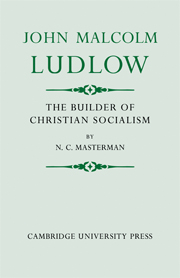Book contents
- Frontmatter
- Contents
- Acknowledgements
- INTRODUCTION
- I THE PARISIAN SCHOOLBOY
- II THE STRANGE YOUNG LAWYER
- III THE FRATERNAL CHRISTIAN
- IV FRENCH SOCIALISM FOR ENGLISH CHARTISTS
- V THE STATESMAN OF CO-OPERATION
- VI THE PRODUCER'S THEORETICIAN
- VII A PROPHET OUT-PROPHESIED?
- VIII REVIEWER AND EDUCATIONALIST
- IX THE DEMOCRATIC IMPERIALIST
- X THE MENTOR OF GERMANS
- XI LEGISLATOR AND CIVIL SERVANT
- XII THE CRITICAL UNIONIST
- Conclusion: LUDLOW'S ACHIEVEMENT
- Appendix: LUDLOW ON THE JUNTA
- Notes
- Bibliography
- Index
II - THE STRANGE YOUNG LAWYER
Published online by Cambridge University Press: 07 October 2011
- Frontmatter
- Contents
- Acknowledgements
- INTRODUCTION
- I THE PARISIAN SCHOOLBOY
- II THE STRANGE YOUNG LAWYER
- III THE FRATERNAL CHRISTIAN
- IV FRENCH SOCIALISM FOR ENGLISH CHARTISTS
- V THE STATESMAN OF CO-OPERATION
- VI THE PRODUCER'S THEORETICIAN
- VII A PROPHET OUT-PROPHESIED?
- VIII REVIEWER AND EDUCATIONALIST
- IX THE DEMOCRATIC IMPERIALIST
- X THE MENTOR OF GERMANS
- XI LEGISLATOR AND CIVIL SERVANT
- XII THE CRITICAL UNIONIST
- Conclusion: LUDLOW'S ACHIEVEMENT
- Appendix: LUDLOW ON THE JUNTA
- Notes
- Bibliography
- Index
Summary
As a boy Ludlow appeared to be a highly integrated person, sure of himself and of what he wanted to do. In England he lost, for a time at any rate, that self-assurance; though in his determination to build, up a faith of his own which would enable him to recover it, he developed a strength of will very different from that of those who lightly conform to accepted creeds. Unable to attach himself to any group, as he felt that some of its demands might threaten his integrity, he sought to penetrate below the upper stratum of society with its factions and divisions of opinion to the poverty on which it rested, and to identify himself with the suffering of men and women who lived, in undifferentiated squalor. He found he could sympathise with these victims of nineteenth-century civilisation, though he would try and transform them by making them into a new kind of society, prophetic of the future and nearer to his own heart's desire. This society would embody concepts from all the different groups with which he had come into contact. It would be a new integration made by one who had undergone a process of disintegration. Needless to say, its fairest features would come from democratic and fraternally-minded France from which he had voluntarily accepted banishment, and which, stirred by memories of defeat, was, he believed, pioneering towards a more radiant future of universal brotherhood.
- Type
- Chapter
- Information
- John Malcolm LudlowThe Builder of Christian Socialism, pp. 24 - 50Publisher: Cambridge University PressPrint publication year: 1963



